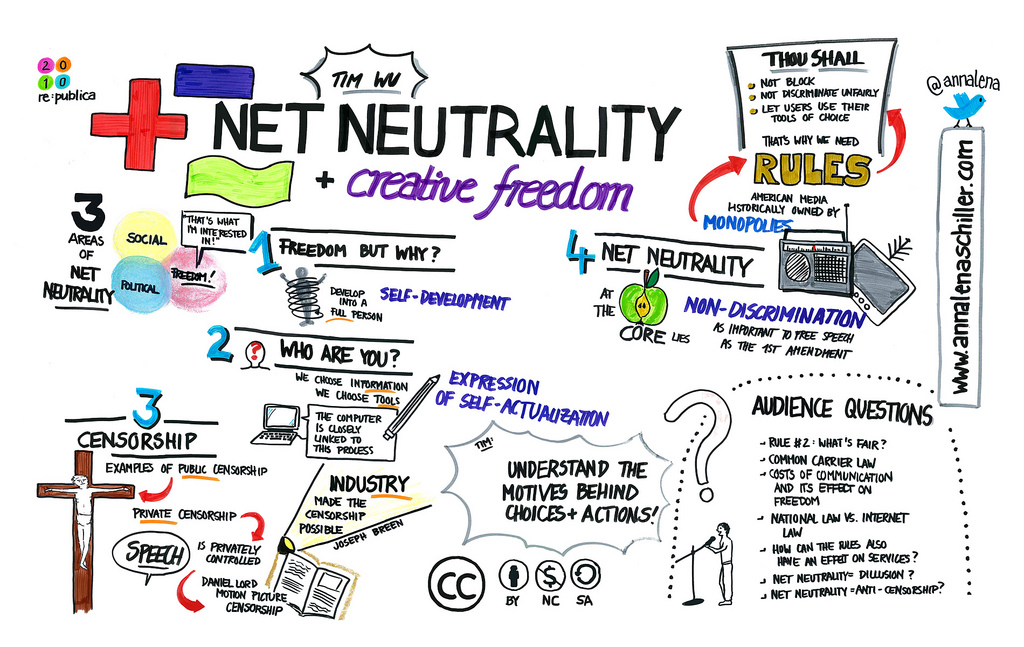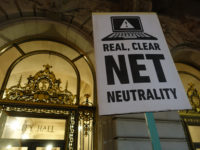The government’s expert panel on broadcast and telecommunications law reform is expected to release its preliminary report on the results of its public consultation next month. The panel has remarkably kept the submissions to the consultation secret, rejecting an open and transparent policy making process that the government insists is essential to good policy development. I filed an Access to Information Act request for some of the more notable submissions (some have been made available and are posted online by the FRPC). An interim release of that request just arrived in my inbox and I’ll have a couple of posts on point over the next few days.

Net Neutrality And Creative Freedom (Tim Wu at re:publica 2010) by Anna Lena Schiller (CC BY-NC-ND 2.0) https://flic.kr/p/7VfazT
Net Neutrality
CRTC Chair Opens the Door to Weakening Canadian Net Neutrality Rules
The Canadian government’s strong pro-net neutrality position has served as its telecom policy foundation with Prime Minister Justin Trudeau and other government ministers frequently citing Canada’s commitment to the policy. In fact, the current review of broadcast and telecommunications legislation described net neutrality as “a key Government priority given its importance for freedom of expression and the ‘innovation without permission’ ethos that underpins the success of the Internet.”
Yet despite the emphasis on strong net neutrality rules, CRTC Chair Ian Scott used a keynote speech last week to open the door to watering down Canadian net neutrality rules, noting his desire for “flexibility” with the legislation.
The Internet is not an ATM: My Appearance at the Senate Transport and Communications Committee on Broadcast and Telecom Reform
Earlier this week, I appeared before the Senate Standing Committee on Transportation and Communications alongside Carleton professor Dwayne Winseck to discuss broadcast and telecom reform. The Senate study, which largely mirrors the government’s broadcast and telecommunications reform panel, is expected to run into 2019 with a broad mandate that covers everything from affordable access to net neutrality. The discussion was similarly wide ranging with discussion on the failings of the CRTC, the lack of telecom competition, and on the need for real data in assessing the impact of the Internet on the cultural sector.
My opening statement focused on the danger of treating the Internet as equivalent to the broadcast system, the realities of how the Canadian cultural sector is succeeding online, and how policy makers ought to respond the changing landscape for communications in Canada. It is posted below.
Maximum Mudslinging: How Powerful Lobby Groups Are Working to Sideline Civil Society Voices on Digital Policy
With just over a year to go before the 2019 Canadian national election, the upcoming fall Parliamentary session will undoubtedly feature a renewed urgency to pass legislative proposals and craft new policies that will form the basis for future election platforms. Digital issues will surely feature prominently including the copyright review and Copyright Board reform, website blocking proposals, privacy safeguards, the broadcast and telecom review, a national data policy, and the implementation of the IP strategy. The same is true elsewhere with Europe to again consider copyright reform, the U.S. assessing privacy rules, and many other countries engaged in digital policy initiatives. However, just as the broader public is finding its voices on these issues with policy submissions, petitions, and efforts to ensure that a public interest perspective is a core part of the process, the traditional lobby groups that have long dominated the policy discourse are steadily working to undermine those efforts with cries of user voices being “mob-driven“, “hacking“, or “disinformation.”
Court Rules Quebec Plan for Mandated ISP Blocking of Online Gambling Sites is Unconstitutional
The Quebec Superior Court has ruled that the provincial rules creating a mandated ISP blocking system for unlicensed online gambling sites is unconstitutional. The provincial government introduced the rules in 2015, which create a list of unlicensed sites that ISPs must block or face financial penalties. While the government tried to frame the blocking system as a health and safety measure, it was always obvious from its own documentation that the plan was primarily focused on increasing revenues of Loto-Quebec, a provincially licensed online gambling site.











